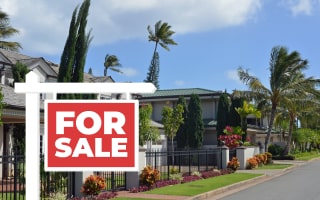Home Buying in Hawaii

The median household income in Hawaii is $92,000, yet the median home price is $854,669. In a recent month, about 21 percent of homes sold for more than the list price, and 57 percent sold for less than the list price. Asking prices vary from one area of the state to another, such as:
- Kauai, where the median list price has topped $1 million, 3 percent above last year's prices,
- Pearl City, outside Honolulu, where the median price is $933,190.
- Maui's median price is up 5 percent, to more than $1 million.
- The median price for a condo in Hawaii is $528,000.
- Honokaa, an inland community in Hawaii, where the list price has only increased 2 percent in a year, to a median of $639,800.
Hawaii's low inventory and high prices indicate a seller's market. That means homes generally sell for the asking price or above because there are more buyers than homes available. Currently, listing prices are up 2-4 percent over a year ago, and sale prices are higher than the listing prices, indicating a very competitive market in which buyers are stretching their budgets to bid more for homes.
It takes about 25 days for a home to sell in Hawaii. With the current low inventory, prequalified buyers are in the best position to move quickly. To get a mortgage, you need a solid work history and a credit score above 600.
Finding the Right Home

The state requires sellers of homes in Hawaii to disclose known defects to buyers. The disclosure law covers more than the property condition; it includes information like:
- The type of foundation and whether it has settled or is deteriorating
- Whether a murder or suicide has taken place on the property
- If drug manufacture or trafficking has taken place on-site
- Any improvements that have been made during the owner's tenure
Any prospective buyer who bids on the home should get a copy of the disclosure. A property inspection is still important to determine the extent of any issues and the potential costs. This information may cause renegotiation of the selling price, which is common. The buyer's down payment should be contingent upon the property passing inspection without significant issues.
Parts of Hawaii can be remote and challenging to reach. Ocean storms sometimes sweep the islands, causing floods that close roads. Therefore buyers should consider the following when purchasing a rural property:
-
Access to healthcare and emergency services
-
Self-sufficiency for several days, including communications
-
Dealing with wildlife, including feral pigs
In urban areas of Hawaii, considerations include:
-
Crime
-
Traffic
-
Smaller than average homes
Violent crime in Hawaii is moderate compared to other states. Annually, Hawaii records less than 300 violent crime incidents per 100,000 residents, fewer than in Alaska, Arkansas, Tennessee, South Carolina, and Louisiana. Property crimes are higher in Hawaii than in other states, at a rate of 2,400 per 100,000 residents. The national average is 1,900 per 100,000.
What is the Typical Home Buying Process in Hawaii
Your budget won't stretch to bid more than the asking price of many properties on the Hawaiian islands. But if you've narrowed your choices to realistic locations, prequalified for a mortgage, have a significant down payment ready, and are prepared to waive contingencies for the right property, you could live here, too.
A buyer's agent is a trained realtor who can guide you through the buying process. This realtor helps you find properties that most closely match your desired location and amenities. They help you develop a strategy for finding and purchasing a home, including writing your offer and negotiating the price.
Commonly, the best buyer's agents have the price history of a home, pros and cons of the local area, and property tax information available for each location you consider. In addition to helping with the initial offer, they will help hire an inspector, provide options for renegotiating the price if there are structural or systemic issues, and keep the closing process on track.
In a new twist, buyer's agents now negotiate their commission with the buyer. Buyers must sign a contract describing the agent's role and payment.
The process of buying a home is:
-
Getting recommendations for a buyer's agent from friends and colleagues.
-
Prequalifying for a mortgage.
-
Ranking your optimal locations for a home.
-
Establishing a buying strategy and budget.
-
Making an offer.
-
Making a down payment.
-
Inspecting the property.
-
Having the deed researched.
-
Closing, including paying closing costs.
Financing Your Home Purchase

Learn about what you can afford by getting prequalified for a mortgage. The median household income in Hawaii is $92,000. The most a mortgage company will loan to someone with that income is $400,000 in today's high-interest economy. You're limited to paying about $2,800 or less per month for your mortgage (and PMI if necessary). That's because mortgage lenders won't allow people to spend more than 30 percent of their income on mortgage payments.
Your local bank may extend a good rate when you're shopping for a mortgage, so talk to both mortgage brokers and your bank. Sometimes new home construction may also have special rates through a designated bank. Mortgage brokers have access to a wide variety of mortgage choices and can find a good deal for you. Your decision may hinge on your comfort level with the mortgage industry.
Your income-to-debt ratio and your history of on-time payments are crucial when applying for a mortgage. Your credit should be above 600 for government-backed loans, and above 640 for other mortgages. Before you start, get free copies of your credit report from the major agencies (Experian, Equifax, and TransUnion) to correct any errors that could complicate and delay your application.
The federal interest rate, now above 7 percent, sets the tone for mortgages. This translates to higher payments for buyers. That's why many longtime homeowners don't want to sell now: they would end up getting a new mortgage at a higher rate and with higher payments.
Some buyers can take over the seller's mortgage, which is beneficial if the mortgage has a low interest rate. Most USDA, FHA, and VA loans are assumable if you qualify for them. However, you have to pay off the equity the owner has built, which is the difference between the property's selling price and the amount left on the mortgage you're assuming. To do so you're likely to need a second mortgage. Talk to your accountant to see if the figures line up in your favor.
Jumbo loans are not uncommon in Hawaii due to high property values. These are nonconforming loans with strict rules that apply to purchase amounts over $1 million.
Mortgage options include these government programs:
- Despite the tight inventory and shortage of affordable units, Hawaii has some first-time homebuyer programs that help lower-income households acquire property.
- FHA mortgages are tailored for first-time buyers with down payments of less than 5 percent.
- Rural properties may qualify for USDA loans, especially buyers with low incomes, but good credit scores.
- Military veterans and their surviving spouses may seek a Veterans Administration-underwritten VA loan. These mortgages do not require PMI and may be used multiple times by qualifying individuals.
Home Insurance

Despite damaging floods and the occasional volcano, most homeowners in Hawaii pay about one-third of the average for property insurance. The national average is $2,700, but Hawaiian homeowners pay less than $1,000 annually. The state does not require property insurance, but mortgage companies often require PMI, a type of insurance that the homeowner pays, to protect their interest in the property. Putting less than 20 percent down on a home triggers a requirement for PMI by lenders. The cost of PMI varies according to your credit score but is generally between $400 and $1,400 per month in addition to your mortgage payment.
Outbuildings must be specifically noted in the policy for coverage. Valuable personal possessions inside the home are unlikely to be covered by insurance unless an additional rider is written.
Home Buying Challenges
Flash floods are a risk on all of Hawaii's islands. Rain and sea level rise can contribute, and in many states, insurers have raised property insurance rates, or, in some cases, stopped insuring properties completely.
The state's tropical environment lends itself to lush fauna and beautiful flowers, but that heat and humidity can make wood-frame buildings deteriorate, creating a haven for borrowing insects that undermine foundations and infest buildings. If you're buying property in Hawaii be sure to inspect for molds, termites, and other causes of weakened structures.
Hawaii Home Inspections
Some common home inspection problems that pop up in Hawaii are roof issues, mold and mildew, and structural problems. Some of this damage may be due to the turbulent weather Hawaii experiences, such as frequent hurricanes, tropical storms, floods, thunderstorms, and even tsunamis. Hawaii home inspections are imperative to ensure there are no serious issues before purchase. If the inspector finds problems, the buyer could negotiate a better deal.
A Hawaii home inspection checks the home's major systems, appliances, structural integrity, and safety features. The items included in a home inspection usually include:
-
Structure: Foundation, walls, columns, chimney, crawlspaces.
-
Attic: Framing, sheathing, insulation, ventilation, electricity, HVAC, and ductwork.
-
Roof: Shingles, flashing, skylights, and gutters.
-
Garage: Doors, door opener, fire separation, walls/ceiling, slab, cabinets.
-
Plumbing: Supply line, main valve, pumps, water heaters, and fixtures (toilets, sinks, tubs, faucets, showers).
-
HVAC: Heating and cooling systems, ductwork, ventilation.
-
Electric: Panels, circuit breakers, outlets, and fault breakers.
-
Interior: Walls, floors, doors, windows, doorbell, closets, ceilings.
-
Safety: Smoke detectors, carbon monoxide alarms, and fire sprinklers.
-
Grounds: Walkways, grading, drainage, driveway, and other property areas.
A home inspection in Hawaii costs between $300 and $800, depending on the property type, age, and size. The average cost of a home inspection in Mililani, Hawaii is $ 350- $800+.
The Process
In a Hawaii real estate transaction, the buyer usually pays for the home inspection because it helps them assess the home's condition before purchase. The process looks like the following:
- Find and hire a reputable home inspection firm.
- Schedule the inspection according to your purchase contract.
- Show up and stay for the entire inspection; ask questions as needed. The inspection will last two to four hours.
- Review the inspection report and decide what to do next.
The top five home inspection companies in Hawaii are:
- Signature Inspections Hawaii LLC - Kailua, HI
- Top Notch Home Inspections LLC - Waikoloa Village, HI
- Diamond Head Home Inspection - Honolulu, HI
- Aloha Home Inspections - Kapolei, HI
- Inspect Hawaii - Honolulu, HI
After the Inspection
After the inspection, the inspector must put all the findings into a written report for the buyer. They give copies to all interested parties. The buyer then has some options available to them if the report finds things that need fixing. The options are as follows:
- Save money by negotiating a lower price due to the repairs needed.
- Ask the seller to make the repairs before closing.
- Ask for a home warranty.
- Secure a reduced down payment.
- If significant issues are found, the buyer can even walk away from the deal without losing any money.
Inspection Top Cities
| City | Inspection Cost | Local Issues | Local Rules | Local Home Types |
|---|---|---|---|---|
| Home Inspection in Mililani | $300-$800 depending on the size and type of property. | Termites, pest infestations, foundation, roofing problems, mold, and plumbing problems. | No local rules. Inspectors do not need to be licensed. | Single-family, townhouses, and condos. |
| Home Inspection in Hilo | $500-$700 for single-family homes, and $400-$500 for condos. | Roof, plumbing, poor drainage, foundation issues, and water damage. | Not mandated and no specific rules. | Single-family dwellings, condos, and duplexes/triplexes. |
| Home Inspection in Waipahu | $300-$450 for condos and $650-$850 for single-family homes. | Termites, pest infestations, plumbing, electrical, and HVAC. | No local rules. | Single-family, townhomes, condos, and multi-family homes. |
| Home Inspection in Kailua | $300-$450 for condos and $650-$850 for single-family homes. | Termites, pests, mold, mildew, plumbing issues, and roof problems. | Usually performed within 15 days after signing the contract. | Single-family homes, condos, and townhomes. |
| Home Inspection in Kaneohe | $300-$800 based on the location, size, and type of property. | Termites, pests, infestations, structural issues, and drainage problems. | No specific local rules. | Single-family homes, condos, townhomes, duplexes, and triplexes. |
Instant Access to Hawaii Property Records
- Owner(s)
- Deed Records
- Loans & Liens
- Values
- Taxes
- Building Permits
- Purchase History
- Property Details
- And More!